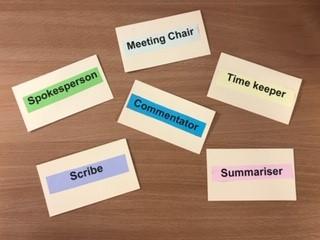What is the difference between a group and a team?
It might be useful to reflect on your own experience of working and learning in groups. In your experience, when does a group become a team?
Individuals come together to form a group. When that group of individuals has a common purpose or task to achieve, they might then start to become a team.
Team Lifecycle
It can be helpful to think of groups as having a lifecycle; they go through stages in order to become fully effective and productive. Bruce Tuckman suggests a life cycle of five stages. Use this activity to see if you can identify what the stages are:
ACTIVITY: What are the five stages of the group lifecycle?
All groups are different and you may find that your group speeds through or skips some of these stages, or perhaps gets stuck at one stage. However, Tuckman's model suggests that it is a good idea to establish good working relationships from the start, and to schedule a halfway review to check progress, nudge the group forward and refocus on your team goal.
Completing the planning wizard together will help get the groupwork process off to a proactive start and help bring your group together as a team (the 'Task' page provides you with a comprehensive guide of things to discuss and bring out into the open as you work through the wizard). The Activities page gives you practical ideas for working together effectively throughout your team's lifecycle.
Team Roles
When working on projects and assignments, some groups may decide that the best way to organise themselves is to allocate team roles specific to the task. This can make it easier to share the workload, but it can sometimes lead to conflict as some roles might involve more responsibility or workload.

As a team it is worth taking time to consider the following questions about each individual's team role:
- What does each individual bring to the team (experience, knowledge, skills)?
- What does each individual want to get from their team role in this assignment (experience, knowledge, skills, grade)?
- How will you spread the workload fairly?
- What key roles and contingency roles might people take?
- Will you designate roles (e.g. a leader/ chairperson) for the duration of the project or on a rotating basis?
- Is it necessary to designate a 'leader' or 'manager'?
- How will you balance getting the task done vs achieving the learning outcome?
See the TABS and Activities page for more guidance about team roles. The Individual page helps you think more about how you can balance getting the task done as a team while maximising your own individual learning.